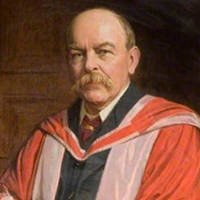John Henry Poynting
John Henry Poynting FRS was an English physicist. He was the first professor of physics at Mason Science College from 1880 to 1900, and then the successor institution, the University of Birmingham until his death.
John Henry Poynting, a British physicist who introduced a theorem that assigns a value to the rate of flow of electromagnetic energy known as the Poynting vector.
Poynting was the youngest son of Thomas Elford Poynting, a Unitarian minister. In his boyhood he was educated at the nearby school operated by his father. From 1867 to 1872 he attended Owens College, now the University of Manchester. From 1872 to 1876 he was a student at Cambridge University, where he attained high honours in mathematics. In the late 1870s he worked in the Cavendish Laboratory at Cambridge under James Clerk Maxwell. In 1880
he became a professor of physics at Mason Science College (later the University of Birmingham) from 1880 until his death. In papers published in 1884–85, he showed that the flow of energy at a point can be expressed by a simple formula in terms of the electric and magnetic forces at that point. This is Poynting’s theorem. He also wrote papers on radiation and the pressure of light. After 12 years of experiments he determined in 1891 the mean density of the Earth and in 1893 the gravitational constant, a measure of the effect of gravity. He published his results in The Mean Density of the Earth (1894) and The Earth; Its Shape, Size, Weight and Spin (1913).

John Henry Poynting
Date of Birth: 09 Sep 1852
Birth Place: Monton, Eccles, United Kingdom
Proffession: English physicist
Nationality: United Kingdom
Death: 30 March 1914, Birmingham, United Kingdom


